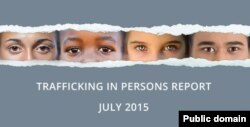President Barack Obama has proclaimed January as National Slavery and Human Trafficking Prevention Month. On Tuesday, top U.S. officials renewed pledges to combat human trafficking through interagency efforts and public-private partnerships.
Calling human trafficking a "multi-billion-dollar criminal enterprise," Secretary of State John Kerry pointed out that fighting this problem is both a moral obligation and a national security issue.
"I believe this is a fight that we can win but, most importantly, this is a fight we have to win,” Kerry said in a cabinet-level meeting at the White House. “You can't have 20 million people in modern times literally enslaved and waiting for the moment when a government, a responsible entity, might step up and help protect them as we should."
Kerry added that more than 20 million people are enslaved every year, but only 1 percent are identified.
The White House listed priorities to monitor and combat human trafficking, including strengthening the rule of law, funding victim services, preventing trafficking in federal contracts and private sector supply chains, and increasing public awareness.
One of the initiatives is a new in-person registration program to enhance protections for domestic workers employed by foreign personnel at foreign missions in Washington. The State Department plans to expand that registration program to workers employed by personnel at international organizations throughout the U.S.
Trafficking report
In July of 2015, the State Department's Trafficking in Persons report listed Mexico as a source and destination country for men, women and children subjected to sex trafficking and forced labor.
U.S. Attorney General Loretta Lynch said the Department of Justice and the Department of Homeland Security have been working with Mexican law enforcement counterparts to enhance the investigation and prosecution of trafficking networks operating across the border.
"Since 2009, this bilateral effort has led to U.S. federal prosecutions of over 170 defendants, prosecutions in Mexico of over 40 traffickers associated with these networks, and the extradition of eight defendants from Mexico to the U.S.,” Lynch said. “Most importantly, this effort has led to the rescue of over 200 victims and, even more importantly, the recovery of over 20 victims' children from the trafficking networks controlled."
The State Department has been required by law to release an annual Trafficking in Persons report since 2001. While it lays out clear minimum standards to eliminate trafficking, some experts have criticized it, saying it fails to provide a consistent method for evaluating compliance.
For example, Cuba, a country that has been under fire for years of non-compliance, was upgraded in the 2015 annual report. Some human rights activists speculated that Cuba's upgrade was based on U.S. political motives.






